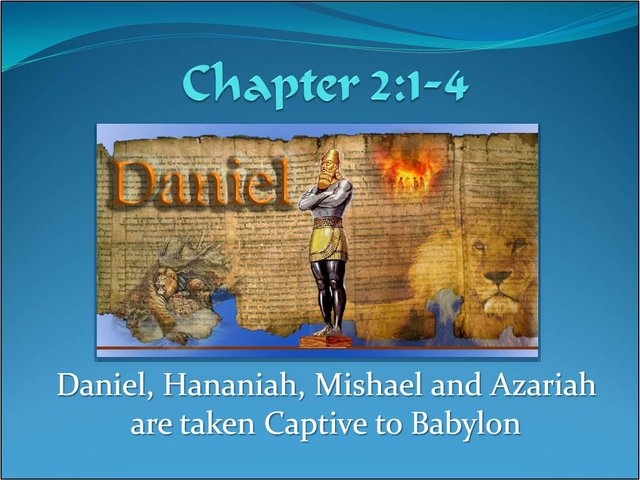God gave Pharaoh and Nebuchadnezzar troubling dreams to fulfill His divine purposes.

In the second year of his reign, Nebuchadnezzar had dreams; his mind was troubled and he could not sleep. So the king summoned the magicians, enchanters, sorcerers and astrologers to tell him what he had dreamed. When they came in and stood before the king, he said to them, “I have had a dream that troubles me and I want to know what it means.” Daniel 2:1-3
ANY PART OF THE DAY OR YEAR IS CONSIDERED A FULL DAY OR YEAR
Daniel and his companions were taken into captivity in 605 B.C. The second year of Nebuchadnezzar’s reign was in the spring of 603 B.C. The first three and a half verses of chapter two of the Book of Daniel were written in Hebrew. According to Hebrew understanding, any part of the year is reckoned as a full year. Although Daniel and the three other Hebrew captives had completed their three years of training and were in the service of the king, they weren’t present at this meeting.
For as Jonah was three days and three nights in the belly of a huge fish, so the Son of Man will be three days and three nights in the heart of the earth. Matthew 12:40
According to Jewish custom any part of a day, however small, is included as part of a full day. Since the Jews reckoned part of a day as a full day, the "three days and three nights" could allow for the day of the crucifixion when Jesus was placed in the tomb and that period of time was reckoned as a full day. He remained in the tomb for the entire second day during the Sabbath. Finally, Jesus spent the evening and then rose early on the first day of the week which was reckoned as the third full day.
PHARAOH ALSO EXPERIENCED TROUBLING DREAMS
Over 900 years earlier in 1532 B.C., God gave another pagan emperor troubling dreams as well.
In the morning his mind was troubled, so he sent for all the magicians and wise men of Egypt. Pharaoh told them his dreams, but no one could interpret them for him. Genesis 41:8
God is sovereign. It is his absolute right to do all things according to his own good pleasure. God is supreme in power and authority,
The king’s heart is in the hand of the LORD, like the rivers of water; He turns it wherever He wishes. Proverbs 21:1
Although Pharaoh and Nebuchadnezzar ruled mighty empires, had vast wealth, and held supreme authority over many people, they were still subject to the sovereign will of the LORD. God gave both of these kings troubling dreams to fulfill His divine purposes.
TELL US YOUR DREAM
Then the astrologers answered the king, “May the king live forever! Tell your servants the dream, and we will interpret it.” Daniel 2:4
With the reply of the Chaldeans, “May the king live forever! Tell your servants the dream, and we will interpret it,” there is a language change in this verse from Hebrew to Aramaic that continues to the end of chapter 7.
WHY TWO LANGUAGES
Hebrew is used in Daniel 1:1-2:4a; 8:1-12:13, while Aramaic is found in 2:4b-7:28. I propose that the reason for this peculiarity would seem to stem from the fact that Daniel had two distinct, although related, messages to deliver.
One was a message of judgment concerning the defeat and final overthrow of the Gentile world powers of whom Nebuchadnezzar, Belshazzar, Darius and Cyrus at that time were the chief representatives. The other was a message of consolation and hope concerning the future deliverance for God's people, the nation of Israel. The first passage Aramaic, the lingua franca of the Near East, was appropriate for the prophet's message concerning the future history of the Gentile kingdoms.
The second message, which is exclusively directed to the Hebrew people, is appropriately in Hebrew. What concerned the Gentiles was written Aramaic, the commercial and diplomatic language of the time. That which concerned the people of Israel was written in Hebrew, although on the basis of chapter 1, which is an introduction to the book, the entire prophecy would, when written down by Daniel, be addressed to the Jewish people.
DREAM BOOKS
The Egyptians and Babylonians were two ancient cultures that analyzed dreams and recorded them in “Dream Books,” texts that we now are able to study in translation. Dreams were classified into several types. Those of rulers and leaders such as priests were seen as one type, and those of common people of another. There was also a division between good dreams and bad dreams. Babylonian dream beliefs were so prevalent in the ancient society that it was from Babylon that some of the first dream dictionaries sporting beliefs and observations of dreamers were compiled.
The astrologers wanted the king to tell them his dream so that they could consult their dream books and interpret his dreams according to the established rules and guidelines of dream interpretation.
